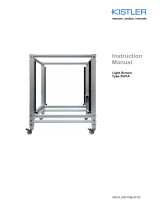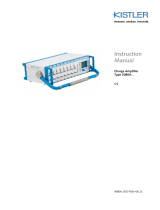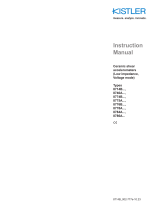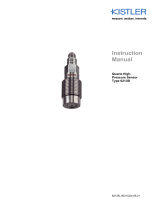Page is loading ...

Instruction
Manual
Target System
Type 2523
A
2
523A_002-706e-11.14

Instruction
Manual
Target System
Type 2523A
2523A_002-706e-11.14


Foreword
2523A_002-706e-11.14 Page 1
Foreword
Thank you for choosing a Kistler quality product
characterized by technical innovation, precision and long
life.
Information in this document is subject to change without
notice. Kistler reserves the right to change or improve its
products and make changes in the content without
obligation to notify any person or organization of such
changes or improvements.
©2014 Kistler Group. All rights reserved. Except as
expressly provided herein, no part of this manual may be
reproduced for any purpose without the express prior
written consent of Kistler Group.
Kistler Group
Eulachstrasse 22
8408 Winterthur
Switzerland
Tel. +41 52 224 11 11
Fax +41 52 224 14 14
www.kistler.com

Target System Type 2523A
Page 2 2523A_002-706e-11.14
Content
1. Introduction .................................................................................................................................. 3
2. Important Information ................................................................................................................. 4
2.1 Disposal Instructions for Electrical and Electronic Equipment ............................................ 4
2.2 Software Upgrades and Updates ........................................................................................ 4
3. Basic Characteristics of Target System Type 2523A .............................................................. 5
3.1 Sensor Element: Modular Optical Gate .............................................................................. 5
3.2 Principle of Type 2523A Function ....................................................................................... 7
4. Installation .................................................................................................................................... 8
4.1 Safety Precautions for Working with Type 2523A .............................................................. 8
4.2 Choosing Suitable Location for Type 2523A ....................................................................... 9
4.3 Installation of Type 2523A and Connection to Transient Recorder Type 2519A… .......... 11
5. Calibration .................................................................................................................................. 12
6. Maintenance ............................................................................................................................... 13
6.1 Cleaning of Modular Optical Gates ................................................................................... 13
7. Troubleshooting ........................................................................................................................ 14
8. Appendix .................................................................................................................................... 15
8.1 Technical Parameters of Type 2523A ............................................................................... 15
8.2 Dimensions of Type 2523A ............................................................................................... 16
8.3 Protection Classification IP66 (according to DIN EN 60529 / VDE 0470) ....................... 17
Total pages 18

Introduction
2523A_002-706e-11.14 Page 3
1. Introduction
Please take the time to thoroughly read this instruction
manual. It will help you with the installation, maintenance,
and use of this product.
To the extent permitted by law Kistler does not accept
any liability if this instruction manual is not followed or
products other than those listed under Accessories are
used.
Kistler offers a wide range of products for use in
measuring technology:
Piezoelectric sensors for measuring force, torque,
strain, pressure, acceleration, shock, vibration and
acoustic-emission
Strain gage sensor systems for measuring force and
torque
Piezoresistive pressure sensors and transmitters
Signal conditioners, indicators and calibrators
Electronic control and monitoring systems as well as
software for specific measurement applications
Data transmission modules (telemetry)
Kistler also develops and produces measuring solutions
for the application fields engines, vehicles, manufac-
turing, plastics and biomechanics sectors.
Our product and application brochures will provide you
with an overview of our product range. Detailed data
sheets are available for almost all products.
If you need additional help beyond what can be found
either on-line or in this manual, please contact Kistler's
extensive support organization.

Target System Type 2523A
Page 4 2523A_002-706e-11.14
2. Important Information
2.1 Disposal Instructions for Electrical and Electronic Equipment
Do not discard old electronic instruments in municipal
trash. For disposal at end of life, please return this
product to an authorized local electronic waste
disposal service or contact the nearest Kistler
Instrument sales office for return instructions.
2.2 Software Upgrades and Updates
Kistler may from time to time supply upgrades or updates
for embedded software. Such upgrades or updates must
always be installed.
Kistler declines any liability whatsoever for any direct or
consequential damage caused by products running on
embedded software which has not been upgraded or
updated with the latest software supplied.

Basic Characteristics of Target System Type 2523A
2523A_002-706e-11.14 Page 5
3. Basic Characteristics of Target System Type 2523A
The electronic Target System Type 2523A is based on
two vertical and two oblique optical gates. When a
projectile passes through these gates, its position is
converted into time intervals, which can be measured
using Transient Recorder Type 2519A… .
The highly responsive optical gates developed for this
instrument work in the infrared spectrum. They provide
very good measurement accuracy for a wide range of
projectile velocities. Type 2523A can measure subsonic
and supersonic velocity ammunition. Thanks to special
filters it is also possible to measure velocities near the
speed of sound and easily remove unwanted shock-wave
effects.
This device has been designed for best performance in
combination with Transient Recorder Type 2519A… . The
control software of Type 2519A… includes the necessary
analysis and calibration algorithms for use with Type
2523A.
3.1 Sensor Element: Modular Optical Gate
IR TRANSMITTER MODULE
IR RECEIVER MODULE
PC Board
Sealing compound
IR Receiver / Transmitter
Aluminium alloy shell
Protection cover

Target System Type 2523A
Page 6 2523A_002-706e-11.14
These optoelectronic elements were developed as a
common basic building block of our two standard
products:
Type 2521A Light Screen
Type 2523A Target System
The modules are also suitable for building customized
systems. It is possible to build target systems up to 2x2 m
active area and up to 3x5 m safe passage area or large
frameless light screen systems with 5 m maximum
distance between transmitter and receiver.
The main advantages of this modular system are:
IP67 sealing without internal cavities
A special sealing compound serves to protect the optical
gate against water, humidity, thermal shocks, mechanical
stresses etc. Due to complete sealing of all electronic
parts, the receiver and the transmitter are completely
splash-proof and resistant against condensation of
humidity and settling of dust. These features are highly
important to enable outdoor use of Type 2523A,
especially in tropical climates.
High stiffness construction with damping of vibration
The shell construction made of aluminium alloy filled with
viscoelastic compound is characterized by high stiffness
and good damping of vibrations caused by shock waves.
This is very important for suppression of interferences to
reach maximum accuracy and repeatibility of
measurements and for long instrument lifetime.
Easy wet cleaning of receiver and transmitter
modules
The performance of all optoelectronic systems depends
on the cleanness of the receiver and transmitter modules.
If the modules are dirty, the effective signal decreases
and the measurement is inaccurate. When using a target
or light screen system near a sand bullet catcher or
generally in a dusty environment, it is necessary to clean
the receiver and transmitter modules every day. Dry
cleaning is impractical due to the risk of scratching the
sensitive diodes. Non-abrasive wet cleaning using a
water jet is significantly safer, easier and faster. The IP67
protection of the Modular Optical Gates allows wet
cleaning.
Modularity and interchangeability of gates
Target System Type 2523A and Light Screen Type
2521A use the same Modular Optical Gate receiver and
transmitter modules and the same aluminium frame. This
modularity and interchangeability is important to reduce
service cost and time. A small stock of spare parts is
sufficient for all target and light screen systems.

Basic Characteristics of Target System Type 2523A
2523A_002-706e-11.14 Page 7
Active shock-wave suppression and ambient light
suppression
A special electronic network suppresses shockwaves and
light flashes. Another servo loop compensates
automatically for a wide range of ambient light.
3.2 Principle of Type 2523A Function
The Target System works on the principle of converting
the projectile position to a time interval, which can be
measured by means of Transient Recorder Type
2519A… . The analysis software converts the time
intervals to XY coordinates, filters noise, visualizes the hit
position and calculates target statistics.
Type 2523A contains two vertical gates (at the input and
output frame), which measure the time interval
dependent only on the projectile velocity and
independent of the projectile position.
Two diagonal gates (one across width and one across
height – coordinates X and Y) are placed between the
vertical gates. These diagonal gates generate impulses,
which are dependent on the projectile position. The figure
shows the typical signals produced by the two projectiles
A and B on the diagonal gate and the two vertical gates.
The coordinate of the projectile can be computed from
the ratio of the intervals 1-2 and 1-a (or 1-2 and 1-b).
2b1
2
a
1
B
A

Target System Type 2523A
Page 8 2523A_002-706e-11.14
4. Installation
4.1 Safety Precautions for Working with Type 2523A
Only qualified personnel may operate Type 2521A
or 2523A. The producer is not responsible for any
accidents caused by unqualified personnel.
All cable connectors must be connected to the
corresponding panel connectors and carefully
tightened.
All unused panel connectors must be covered by
means of carefully tightened special caps.
Never disconnect any connectors if instrument is
wet, switched on or connected to power line.
It is strongly recommended to install one of these
devices
- Residual Current Device (RCD)
- Residual Current Circuit Breaker (RCCB)
- Ground Fault Circuit Interrupter (GFCI)
- Ground Fault Interrupter (GFI)
- Appliance Leakage Current Interrupter (ALCI)
in Type 2521A power line to prevent
electrocution
Types 2521A and 2523A can be connected only to
corresponding power lines according to valid
electrotechnical specifications. Use standard
protective devices against power line overvoltage.
Working personnel must keep valid safety
precautions for manipulations with electrotechnical
devices. The instrument must be disconnected from
the power line prior to manipulations with the cables.
If you find any (even partial) damage of a Type
2521A or 2523A instrument, it is strict forbidden to
use this instrument. Please contact Kistler Service
immediately.
Never connect any voltage sources to the input or
output connectors, because the instrument may be
damaged.
During installation and operation of Types 2521A
and 2523A, follow the instructions for handling of
Electrostatic Sensitive Devices. Never touch the
connector pins. Discharge yourself from static
electricity before connecting or disconnecting
connectors. Beware of voltage, which may be

Installation
2523A_002-706e-11.14 Page 9
induced in long cables and may damage the
instrument.
The instrument must be protected against
temperature extremes and shocks (see technical
parameters) and excessive mechanical stresses. It
is not allowed to subject the instrument to:
- Direct sunlight
- Thermal sources
- Heavy electromagnetic field sources and
interferences
- Aggressive chemical materials
- Flammable or explosive gases
Turn instrument off when not in use.
Demounting or modification of the instrument is
strictly forbidden. Violation of this condition results in
loss of warranty. The producer is not responsible for
any due accidents.
Use only original equipment and spare parts.
The instrument can be used only for the purpose for
which it was made. The producer is not responsible
for any interpretation of measured results and for
any accidents caused by their applications in
practice. The producer is not responsible for any
changes of instrument properties caused by usage
or aging.
Cleaning of Types 2521A and 2523A is allowed only
if the instrument is turned off and disconnected from
the power line. Never use alkalies, acids and organic
solvents. For detailed information see Maintenance
chapter.
4.2 Choosing Suitable Location for Type 2523A
Choosing a suitable location is very important for correct
functioning of the target system.
Subjecting this electronic system to direct sunlight
may result in overheating. Furthermore, this can
lead to faster LED and PIN phototodiode aging and
irreversible parameter changes.
Because this electronic system is assembled from
optical gates, it cannot be exposed to intensive
parasitic illumination. The common diffuse daylight is
automatically compensated, but intensive illumi-
nation decreases the sensitivity.

Target System Type 2523A
Page 10 2523A_002-706e-11.14
For correct function of this instrument, the projectiles
are required to pass through at a right angle to the
vertical gate plane. The maximum acceptable
deviation in X and Y direction is ±0,5 °. The
instrument should be placed on a solid horizontal
concrete surface. The chassis can be accurately
adjusted to horizontal position by unscrewing two
screws at each wheel (range ±10 mm). Each wheel
has a brake for chassis fixation, which must be
always locked during operation.
90.0°
+0.5°
-0.5°
90.0°
+0.5°
-0.5°

Installation
2523A_002-706e-11.14 Page 11
4.3 Installation of Type 2523A and Connection to Transient
Recorder Type 2519A…
The instrument must be acclimatized to ambient
temperature before unpacking in order to prevent water
condensation inside the connectors.
Connect ‘Analog Out 10 V Pulse’ connector of this
instrument by means of Signal Cable Type
2519AZ100Asp to Transient Recorder Type 2519A…
(see schematic diagram).
Connect ‘Power’ connector of this instrument by means
of Power Cable (Amphenol circular 4 pin connector →
power line connector) to power line socket. Due to its
high degree of IP protection, the instrument does not
have a power switch. An external switch located at a safe
place may be used. Power ON state is indicated by
lighting of the big red LED.
Turning OFF is possible by disconnecting the Power
Cable from the power line socket. Never disconnect the
Amphenol circular connector.

Target System Type 2523A
Page 12 2523A_002-706e-11.14
5. Calibration
The calibration of the instrument is performed using the
Control Software of Transient Recorder Type 2519A… .
A detailed description of the calibration menu and its
items can be found in the Calibration Manual of Type
2523A.
This instrument was calibrated, and time change of
calibration constants is minimal. We recommend to make
service inspection once a year including calibration
inspection.
If you find any systematic deviations in the results during
operation, please contact Kistler Service.

Maintenance
2523A_002-706e-11.14 Page 13
6. Maintenance
This instrument does not require any special
maintenance. Check the cables before measurement
according to IP66 requirements (see Appendix).
Especially check the power cable and its connection.
Check the cleanness of the optical modules. If the
modules are dirty, it is necessary to clean them.
6.1 Cleaning of Modular Optical Gates
In order to prevent scratching of the optical parts, this
instrument may be cleaned using a mild water jet. Never
use a high-pressure water jet. Do not dry-clean the
optical parts.
Disconnect instrument from power line. Remove power
line socket only; never disconnect Amphenol circular
connector.
Wash the entire instrument using clean water. In case of
strong pollution use mild, pH neutral detergent and soft
brush.
In the end wash all optical modules by distilled water.
This is very important for protection against calcium
deposits.
Let the instrument dry.
Check all connectors and cables.
Connect instrument to power line and check all functions.

Target System Type 2523A
Page 14 2523A_002-706e-11.14
7. Troubleshooting
After plugging in the Target System, the red control
lamp does not light
Check power supply voltage in power line.
Check power cable.
In case of failure of an optical gate contact Kistler
Service
Measured signal shows interference with periodic
signal at 50 … 120 Hz
This problem may be due to induction in long cables or
due to a ground loop. Contact Kistler Service for detailed
analysis of the failure.
Measured signal shows heavy aperiodic interference
In case of measurement of ammunition with a velocity
near the speed of sound, it might be a shock wave and
its reflection. The characteristic signal of a shock wave
may be a single pulse or a series of pulses. These pulses
have a typical width of 10 … 20 µs and may be higher in
amplitude than the signal of the actual projectile. In the
manual of Transient Recorder Type 2519A… the use of a
time filter for shockwave suppression is described.
Suitable acoustic damping of the shooting range helps to
further reduce the effects of shock wave and their
reflections.
Another problem may be in industrial interference. Its
elimination is demanding and requires the measurement
of the interference level. Contact Kistler Service for
specific solving of such problems.
No signal on Transient Recorder
The conditions for triggering must be adjusted. Check the
source (channel), which is used for triggering and the
threshold setting. Check also, whether the Light Screen
system is turned on. Check the cable connection.
The problem may be caused by strong incident
illumination on the gates (sun or another sources), which
causes photodiode amplifier desensitization (overloading)
and prevents the normal operation. The problem can be
solved only by shading of the gates.
If the problem persists, this may be a technical failure of
the Light Screen or the Transient Recorder. In this case,
please contact Kistler Service.

Appendix
2523A_002-706e-11.14 Page 15
8. Appendix
8.1 Technical Parameters of Type 2523A
Principle of measurement 4 high-speed optical gates
2 vertical (velocity) 2 oblique (position)
Calibre range mm 4 … 40
Velocity range m/s 50 … 3 000
XY coordinate inaccuracy
highest value, 200 …- 1 500 m/s,
projectile base trigger)
<5 mm or <0,5 % of XY range or 0,5·caliber
Velocity inaccuracy
200 ... 1 500 m/s, 1 000 mm
measuring base, projectile base trigger
% <0,2
Safe passage area (WxH)
Effective sensor area (WxH)
Dimensions WxHxD (approx.)
mm
mm
mm
1 050x1 200
950x950
1 350x1 850x1 100
Reaction time µs 1
Measuring base for velocity mm 1 000
Trigger modes rising / falling
(= projectile nose / base)
Shock wave filter
selectable software filter
µs 0 … 1 000
Threshold level selectable % –75 … 75
of measuring range
Output signals BNC X and Y output
Gain range selectable 1, 2, 5, 10
Working temperature °C –30 … 45
Degree of Protection IP66
Air humidity (condensing or non-condensing) % 100
Altitude maximum m 3 000
Power supply 100 … 240 VDC, 40 W

Target System Type 2523A
Page 16 2523A_002-706e-11.14
8.2 Dimensions of Type 2523A
1345 mm
1105 mm
1805 mm
OUTPWR
1075 mm

Appendix
2523A_002-706e-11.14 Page 17
8.3 Protection Classification IP66
(according to DIN EN 60529 / VDE 0470)
The protection classification offered by an enclosure is
shown by the letters IP (Ingress Protection) and two
digits.
The first digit indicates two factors:
Protection for persons
Protection for equipment
The second digit indicates the protection against water.
First digit: 6 (IP6X)
Protection for persons: Protection against a wire touching
dangerous parts.
Definition: A body 1,0 mm in diameter must not be able to
enter.
Test conditions: The accessing probe is pushed against
every opening of the enclosure with a standardized force
or is inserted through the opening.
Conditions for acceptance: The protection is satisfactory,
if a sufficient distance is kept between the accessing
probe and dangerous parts.
Protection for equipment: Sealed against dust.
Definition: Dust must not enter at all.
Test conditions: The test is carried out in a dust chamber
in which talcum powder is being kept suspended in the
air by means of a dust distributor or a similar device. The
enclosure which is being tested is placed in the test
chamber, while a vacuum pump keeps the pressure in
the enclosure below the atmospheric pressure of the
environment according to the standard.
Conditions for acceptance: The protection is satisfactory,
if there is no visible dust deposit within the enclosure
after completion of the test.
Second digit: 6 (IPX6)
Protection against water: Protection against a powerful
water jet.
Definition: A strong water jet directed at the enclosure
from any direction must not have any harmful effects.
Test conditions: A jet nozzle with an inside diameter of
12,5 mm splashes a volume flow of 100 liters per minute
from a distance of 2,5 … 3,0 meters from all sides onto
the enclosure. The test duration is 3 minutes.
/










